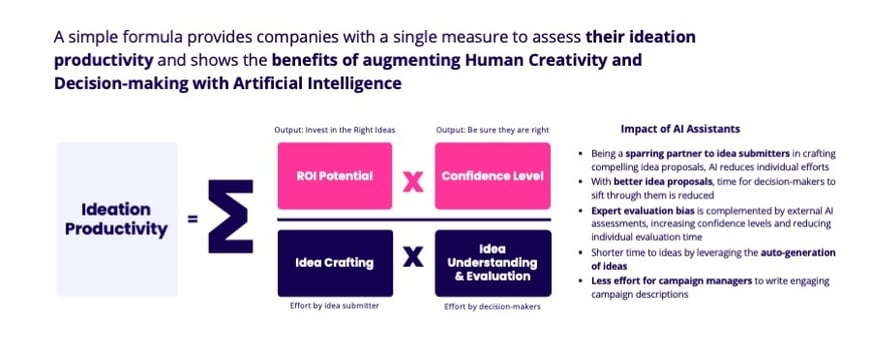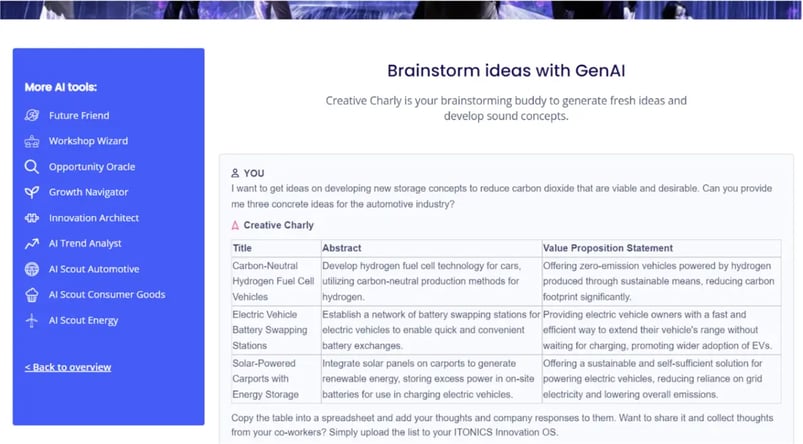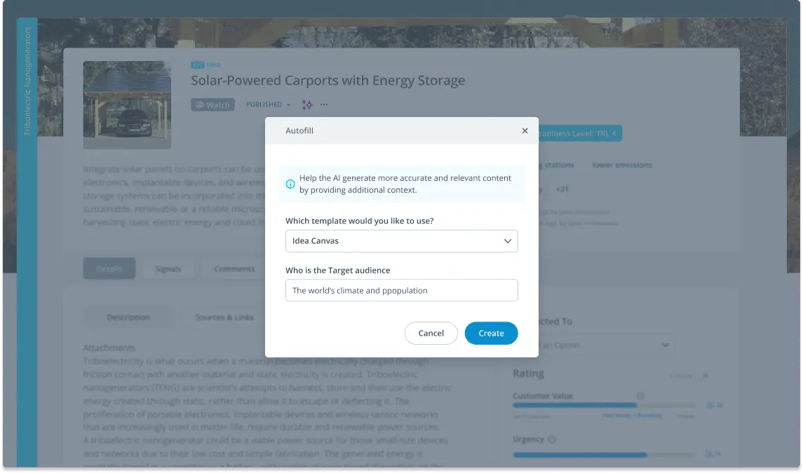Far too often, companies strive for innovation by encouraging employees and partners to submit ideas. Yet the vast majority of these efforts yield minimal results in terms of new profit, improved workflows, and impactful solutions. This tendency leads to what's known as the ideation productivity trap, where an abundance of ideas results in increased effort spent sifting through, analyzing, evaluating, and deciding on which ones to pursue. Fortunately, recent advancements in AI, particularly within the ITONICS Innovation OS, offer elegant solutions to escape this trap. Digital assistants now assist idea submitters in generating and refining ideas, while decision-makers are equipped to avoid evaluation bias and overload.
The ideation productivity trap: When being more innovative turns into being less productive
Every company, at some point, suffers from corporate imposter syndrome—experiencing the fear that they’re falling behind the competition, losing market share, or not being innovative enough.
To counteract these fears—whether overinflated or justified—companies commonly strive to engage, incentivize, and involve their employees and partners to submit their best ideas. They launch idea campaigns, accelerators, or open innovation programs. The approach is appealing, especially for larger companies that have thousands of employees—each bringing a unique perspective, knowledge, and creativity. Taking the golden start-up VC rule, at least 0.5 to 10 percent of these ideas should return as a huge bang for the buck.
However, what is often excluded in the short term is how much effort this means for everyone involved. When this factor is added to the formula, the big promises of collective idea collection seem very tenuous. Instead of a significant increase in innovation potential, the idea productivity of the entire organization actually decreases.
Our simple output-effort formula illustrates this clearly. It also helps us to understand the enormous potential of combining human creativity and decision-making with artificial intelligence.
Results in a nutshell: Escaping the ideation productivity trap with AI

Everyone has ideas; everyone wants to contribute to their company’s innovation success. And many employees feel they simply need an open door and an invitation for their ideas to flourish. This impression downplays the actual ingredients needed to move from initial thought to implementation.
The biggest challenges in ideation are unclear problem-solution fits, ambiguity, and finding experts to evaluate. Opening the doors to the masses only potentiates these common challenges. Drastically.
Most commonly, idea campaigns are set up on top of current operations and priorities. Very seldomly, they are an integral part of companies’ working processes. As such, they require an extra commitment of time and effort from idea submitters who must not only contemplate ideas but also shape them into compelling proposals for evaluation. If not done outside working hours, they will need to balance idea generation with their daily work—diminishing their focus on both.
You hear the clock ticking?! Idea submitters put in this time and effort so that, ultimately, their idea is selected for implementation.
Selection is normally done by an evaluation of the desirability, feasibility, and viability of the idea, in sum, the estimated return-on-investment (ROI) potential. Therefore, it is the combination of ROI potential and the amount of effort invested by the submitter that make up our simple ideation productivity formula. Of course, the less effort spent and the higher the expected return, the better the ideation productivity.
Yet, reality tells us that, most often, idea proposals are imperfect. Evaluators can have a hard time understanding the idea and estimating the desirability, demanding a back-and-forth with idea submitters. Or, to assess each of the components (i.e., desirability, feasibility, viability), different experts may need to be included, which can delay the decision-making process due to different availability. These examples illustrate the effort of the evaluators to identify the best and most promising ideas. Indeed, this effort by decision-makers is the third factor included in our ideation productivity formula.
In addition, evaluators must thoroughly analyze idea proposals to gain confidence in decision-making. During this analysis, they rely on their (subjective) experience and expertise, combined with available evidence. The more concrete evidence, the easier it is to accurately substantiate ROI potential. However, when evidence is lacking or difficult to interpret, decision-making can be biased and lead to suboptimal conclusions.
Now, imagine the effort of both the submitter and evaluator described above, extrapolated to hundreds or maybe even thousands of ideas. Suddenly, the effort becomes a full-time job—and we’re still only in the submission and evaluation stage. No concept has been implemented or tested thus far. And bringing an idea to market might still take up to 5x the time already spent. This is when great promises become economic nonsense.
To escape these traps, companies have different options. And the recent advancements in artificial intelligence might hold the biggest benefits. Instead of spending so much time finding and grinding ideas, generative AI (GenAI) holds the potential to perform the same job within seconds and make iterations and decision-making easier and much more fun.
The ITONICS Innovation OS has caught up with these developments and promises three fruitful directions to consider:
- Escaping the idea-generation trap with auto-generating ideas
- Escaping the idea refinement trap by asking Creative Charly or our Smart Idea Assistant
- Escaping the idea validation trap with auto-rating ideas
Escaping the idea generation trap: Auto-generate ideas
Conventionally, setting up an idea-collection campaign takes time. Idea seekers need to clearly define the challenge to solve, promote incentives, and identify the right audience of potential solution providers. Plus, idea campaign managers need to actively moderate campaigns by continuously motivating participation and evaluation, hitting key campaign milestones, and replying to each submitter with thanks and possibly next steps. These efforts can now be automated.
The ITONICS Innovation OS offers a feature to generate ideas for any given challenge automatically. Idea seekers only need to provide a compelling campaign description. Based on this description, GenAI fills the campaign with on-target, creative ideas. One-click and the Innovation OS produces five unique ideas, including illustrative images, detailed idea descriptions, and tags for easier comparison and classification. Repeat as needed.
Escaping the idea refinement trap: Ask Creative Charly or our Smart Idea Assistant
It is not only campaign initiators who benefit from artificial intelligence. AI is also an important tool for individuals who have a diamond-in-the-rough idea that still needs to be refined into a compelling concept. These are concepts that have a high potential to succeed when they meet the criteria of desirability, feasibility, and validity; when evaluators easily understand them; and when they are in line with a company’s strategic priorities.
Generative AI’s ability to understand context, infer meaning, access a rich database, and generate human-like text makes it an invaluable resource for brainstorming. It offers a fresh perspective, inspiration, and the ability to shape rough ideas into compelling descriptions (more on Gen-AI’s impacts on ideation here).
For brainstorming sessions and additional perspectives, we have now published our Creative Charly. Creative Charly is a digital ideation assistant that helps every idea submitter turn seed thoughts into concrete concepts.
Creative Charly can be accessed 24-7 and offers the unique advantage of crafting a strong idea proposal before it is submitted or awaiting colleagues’ feedback. It also provides you perspective on whether your idea has a market need (desirability) and a chance to generate profit (validity).

If you are already a step further and need to formulate your idea in an attractive and easily understandable idea proposal, our ITONICS Innovation OS offers a smart idea assistant. The smart idea assistant takes your title and a short summary to craft an unbeatable idea proposal.
During the process, you can select from thirteen different storytelling templates. For instance, the smart idea assistant can describe your idea in the words of Albert Einstein or Warren Buffet. Plus, the GenAI will automatically create an illustrative image to visually represent your idea, making it more appealing to viewers and evaluators.

For idea seekers, this increases the quality of idea submissions and, subsequently, reduces the time to sift through all ideas and increases a company’s idea productivity. In addition, it also gives everyone the power to formulate ideas so that they are easily understood—even across different languages and locations. And isn’t it all the more fun to have a sparring partner and helping hand—one who is always available and honest?
Escaping the idea validation trap: Auto-rate ideas
In addition to augmenting human creativity, GenAI also offers the option to cut time when it comes to evaluating and identifying the most promising concepts.
GPTs are adept at sifting through extensive customer feedback, social media discussions, and market trends to assess the appeal of a concept. By interpreting subtle language cues and sentiments, GPTs can offer insights into how well an idea meets customer needs and expectations. This focus on customer preferences ensures that companies allocate resources to ideas with a greater chance of market success.
Beyond capturing customer interest, an innovative concept must also be financially feasible. GPTs can scrutinize business models, market information, and financial forecasts to determine an idea's profit potential. This thorough evaluation assists companies in pinpointing ideas with the best financial prospects, guiding them away from attractive but fundamentally flawed concepts that are unlikely to achieve long-term success. There is no end to the number of company-specific factors that GenAI can help analyze—automatically and accurately to speed up time-to-validation.
.webp?width=705&height=367&name=unnamed%20(2).webp)
The ITONICS Innovation OS offers an auto-rating feature that is customizable to any criteria of interest. This offers an interesting outside-in perspective and perfectly complements internal expert opinions. Ideation managers need only to decide in which phase of the idea process to rate idea proposals and against which criteria. Within seconds, our auto-rate feature compares the idea proposal with the available data and provides an unbiased evaluation. This saves valuable time, empowering you to implement ideas faster and with greater precision than ever before.




